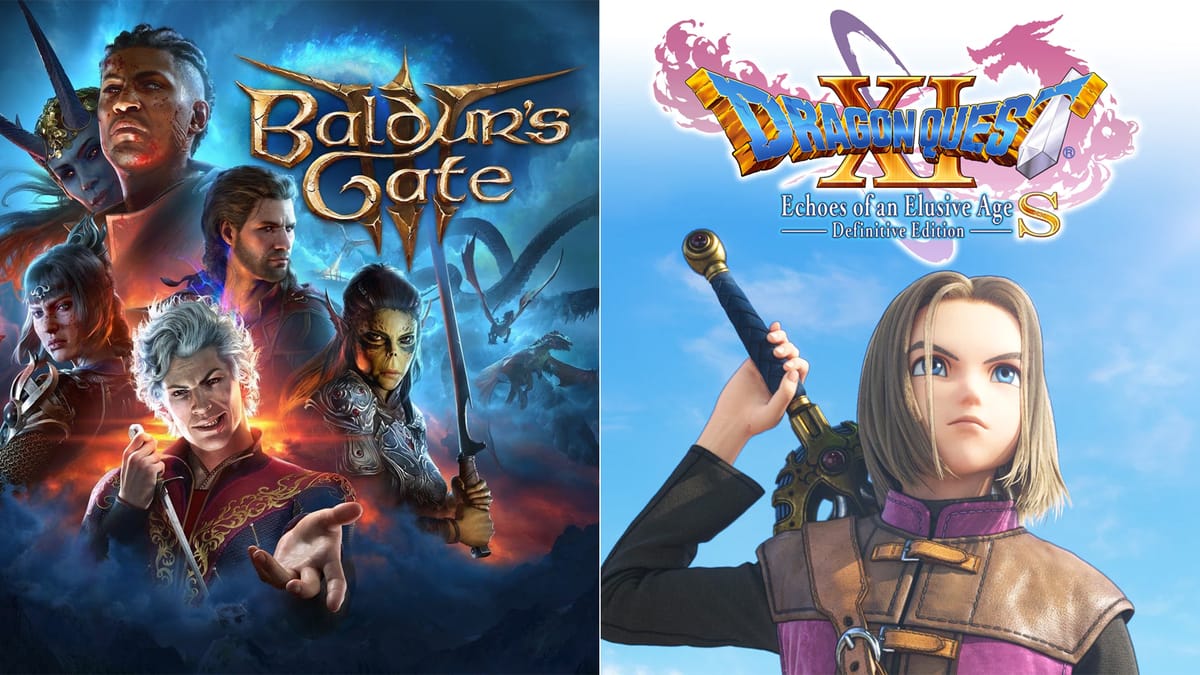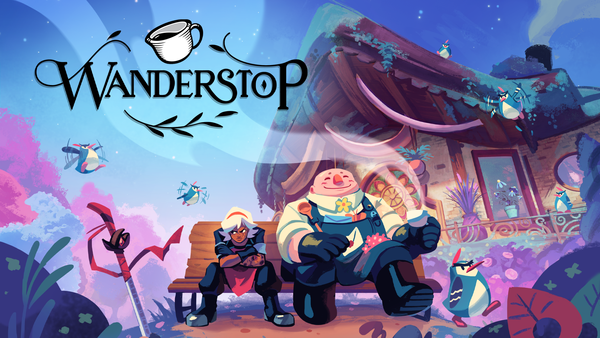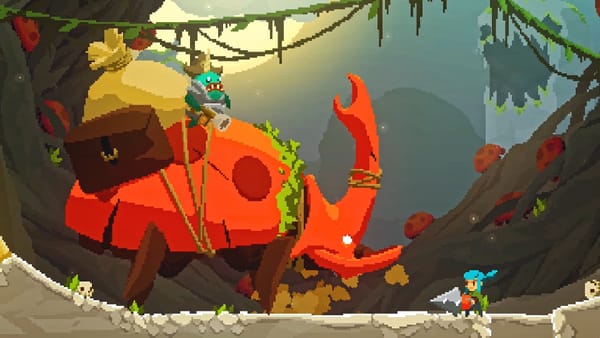Big-Ass RPG Month Part 1: Story
Comparing Baldur’s Gate 3 and Dragon Quest XI, just because

Buckle up, reader, because it’s officially Big-Ass RPG Month. What is Big-Ass RPG Month, you may find yourself asking, somewhat nervously for fear of upsetting someone who seems a little unhinged for having named something “Big-Ass RPG Month?” Well, I’m glad you asked, even if your question was a little mousey in its delivery.
Big-Ass RPG Month is a month where I am going to write about Baldur’s Gate 3 and Dragon Quest XI in conversation with each other for the entire month, because I played and finished both between the months of December 2023 and March 2024, and I’ll be damned if I’m not going to wring two Backlogs out of the cumulative 200 hours that took me.
More seriously than this, I’ve been thinking back on that time, which, to be frank, was as much about avoiding writing my novel as it was about genuinely enjoying both games. To get the avoidance part out of the way—because this is Big-Ass RPG Month, not Grayson Opines about Writing a Novel Again Month—anything I have to say about using games as a means by which to avoid those big projects you care deeply about but also scare the ever-loving shit out of you was best communicated in my Balatro post.
With that out of the way, I’ve found myself looking back on that time and asking how it was that I finished two 80-plus hour experiences back-to-back. I am not a long game kind of guy, especially as I get older and have less time for things outside of my family, job, and novelistic aspirations. My ideal game is less than 10 hours long, or even shorter, frankly, if the price is right. When a reviewer notes that the game was short? I love that. That’s catnip to me. And yet there I was, putting in nearly five workweeks’ worth of hours into two titles. So, since then, I’ve found myself asking: Why? Why did I get so lost in these two?
To answer that question, I’m going to split my thoughts into two newsletters: Story and Gameplay. Novel categories, I know, but stay with me. If you’ve played either, you know that they diverge wildly on both fronts, so Big-Ass RPG Month is my attempt at staking out a claim as to why both captured my attention, despite being polar opposites in many ways.
So, here we go.
Big-Ass RPG Month Part 1: Story
Dragon Quest XI has a kind of bad story that is also kind of good. Let me explain.
Its story is bad because it is both kind of whatever but also requires a decent deal of knowledge of the Dragon Quest series in order to fully appreciate its ending, but also it is kind of good because every character is really charming and the cumulative effect of watching these weirdos muddle through an archetypal plot leaves you really loving them all, to the point where you kind of don’t care that the story ends up being mostly word soup at the end, especially as pertains to what the plot is and what your motivations as a party are. Put another way: I love the characters of DQXI, even as I kind of think the plot is mid.
Baldur’s Gate 3 tells a better story on a plot level. The characters are more nuanced, and their motivations are less stock. It must be said, though, that BG3 also tells a somewhat archetypal story, at least within the confines of Dungeons & Dragons. Mind flayers are bad-bad, and you really oughtn’t mess with them, which you’ll know very quickly upon booting up BG3 if you didn’t already. While there are many subplots and diversions that constitute what I think of as the true narrative meat of the game, the story as a whole more or less comes down to: Do you stand against the big bad mind flayer or do you ally with them? Of course, the choices that lead up to that are much more myriad than this binary suggests, but ultimately, this is the central choice at play throughout.
At the risk of stating the obvious, DQXI and BG3 are going after very different things, narratively. To compare them is, in some ways, a very silly exercise. It would be like comparing a young adult novel to an epic fantasy novel. Which, yeah, as it turns out, that’s exactly the comparison I mean to make.
BG3 is a long, long book you spend a whole summer reading. You lose track of some of the characters and have to remind yourself who they are and what they want before continuing on with the story. You keep the page where they’ve drawn the map dogeared for quick reference. You might take notes as you read. You might even ship a few characters. (Halsin stans, I am among you.)
DQXI, meanwhile, is a young adult novel you purchased at the Scholastic Book Fair when the Scholastic Book Fair was still a thing, which you tore through over a weekend, enjoying the galavanting heroes for what they were: Heroes with a capital H. Their adventure is pure and lighthearted, and, sure, maybe one of them has a surprisingly sad backstory, but overall, the vibe is positive and the possibilities are endless. The sun is shining at the end of the story, and all is well in the kingdom at last.
Except neither of these characterizations is entirely true. Both have elements of the other. DQXI features a surprisingly moving plotline on the nature of death and grief. BG3 features some (admittedly bloody) lighter fare, including plenty of slapstick and a carnival scene (which, yeah, I know, it’s bloody, but it’s not not goofy).
Still, I think these characterizations ring true for my enjoyment of both. I devoured BG3, eager to know what would happen next with every new twist. It makes utmost sense to me that it just won a Hugo. The dialogue alone is a masterclass in characterization. I wanted to savor it, but I couldn’t, so enthralled was I by turning the metaphorical page.
I took DQXI a little more slowly, playing it over the course of several months, exactly like a bedtime story, to quote Tim Rogers’ excellent video review. I felt calmed by DQXI, not riveted, but that wasn’t a bad thing. Sometimes you want to be calmed instead of enthralled. Both stories appealed to different parts of me, but both stories appealed enough to carry me across the finish line. It was just a matter of what flavor I was interested in at the time.
This year, I’ve been working on putting things down when I’m not enjoying them anymore. This might sound like an obvious thing to do, but I’ve always had a habit of completing any piece of media I purchase, be it a book, movie, TV show, or game. When it comes to games, especially since starting Backlog, I often fall victim to the sunk cost fallacy, where I think that if I stop playing something that I’m not enjoying anymore, all that time will be a waste from the perspective of my writing.
Well, no more. I’ve dropped more games this year than I’ve ever done. I’ve started books and put them back on the shelf. I’m confusing the various streaming services’ algorithms by starting hit series but never finishing them. I’m not spending my time on anything that I’m not really enjoying, and it’s been great.
Which is all to say, I think anything that can hold your attention for the equivalent of more than two workweeks (yes, that is my preferred metric now, thank you) is doing something right. Even archetypal stories, told with heart, can be a wonderful thing. In that way, DQXI and BG3 can stand shoulder to shoulder, even if I know which one I would choose, if it only came down to story. Because, c’mon now, there’s no doubt that Baldur’s Gate 3 is the richer narrative.
But in games, the story is only half the story. And in two weeks, I intend to argue that, actually, DQXI is more fun to play than BG3.





